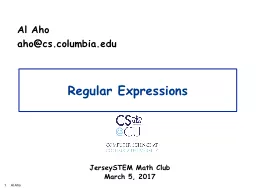PPT-Regular expressions and the Corpus Query Language
Author : kittie-lecroy | Published Date : 2017-06-16
Albert Gatt Corpus search These notes introduce some practical tools to find patterns regular expressions the corpus query language CQL developed by the Corpora
Presentation Embed Code
Download Presentation
Download Presentation The PPT/PDF document "Regular expressions and the Corpus Query..." is the property of its rightful owner. Permission is granted to download and print the materials on this website for personal, non-commercial use only, and to display it on your personal computer provided you do not modify the materials and that you retain all copyright notices contained in the materials. By downloading content from our website, you accept the terms of this agreement.
Regular expressions and the Corpus Query Language: Transcript
Download Rules Of Document
"Regular expressions and the Corpus Query Language"The content belongs to its owner. You may download and print it for personal use, without modification, and keep all copyright notices. By downloading, you agree to these terms.
Related Documents














